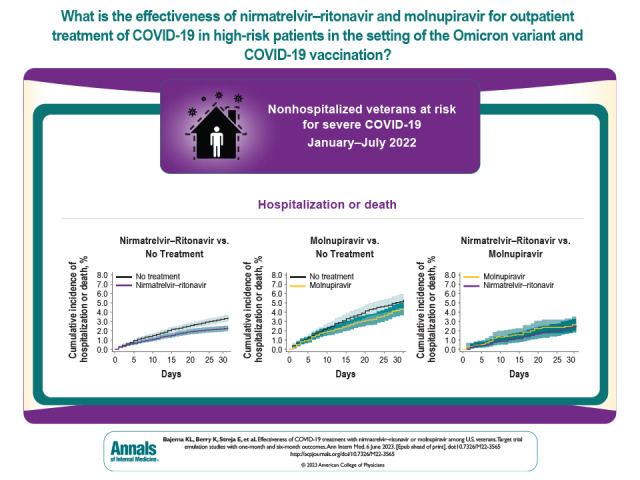Even With Omicron Sublineages; Molnupiravir Appeared Less Effective

Click to Enlarge: Effectiveness of COVID-19 Treatment With Nirmatrelvir–Ritonavir or Molnupiravir Among U.S. Veterans: Target Trial Emulation Studies With One-Month and Six-Month Outcomes
Information about the effectiveness of oral antivirals in preventing short- and long-term COVID-19–related outcomes in the setting of Omicron variant transmission and COVID-19 vaccination is limited. This article summarizes 3 retrospective target trial emulation studies that sought to measure the effectiveness of nirmatrelvir–ritonavir and molnupiravir for outpatient treatment of COVID-19. Source: American College of Physicians
Portland, OR — How effective have oral antivirals actually been in preventing short- and long-term COVID-19–related outcomes? A new study examined that issue during Omicron variant transmission and with limited COVID-19 vaccinations.
The article in Annals of Internal Medicine included results from three retrospective target trial emulation studies comparing matched cohorts of nirmatrelvir-ritonavir versus no treatment, molnupiravir versus no treatment, and nirmatrelvir-ritonavir versus molnupiravir.1
The study was important, because early clinical trials of antivirals that work against COVID-19 were conducted among unvaccinated participants before the emergence of the Omicron variant and subsequent sublineages. Essentially, the researchers found that Paxlovid effectively prevents hospitalization and death, although not as well as in early studies in a younger cohort. Molnupiravir was less beneficial, the study determined.
Participants were nonhospitalized patients being treated by the VHA who were at risk for severe COVID-19 and tested positive for SARS-CoV-2 from January through July 2022. Researchers from the VA Portland, OR, Healthcare System and the Oregon Health & Science University and colleagues focused on intervention with nirmatrelvir-ritonavir, marketed as Paxlovid, or molnupiravir pharmacotherapy.
Pointing out that the VHA is the largest integrated healthcare system in the United States, providing care to more than 9 million veterans, the researchers noted that the majority of veterans receiving VA care are older and have a high burden of underlying medical conditions.
The study team tracked any hospitalization or all-cause mortality at 30 days and from 31 to 180 days. Most of the participants, 87%, were male with a median age of 66; 18% were unvaccinated.
Results indicated that, compared with matched untreated control participants, the 9,607 treated with nirmatrelvir-ritonavir had lower 30-day risk for hospitalization (22.07 vs. 30.32 per 1,000 participants; risk difference [RD], -8.25 [95% CI, -12.27 to -4.23] per 1,000 participants) and death (1.25 vs. 5.47 per 1,000 participants; RD, -4.22 [CI, -5.45 to -3.00] per 1,000 participants).
“Among persons alive at day 31, reductions were seen in 31- to 180-day incidence of death (hazard ratio, 0.66 [CI, 0.49 to 0.89]) but not hospitalization (subhazard ratio, 0.90 [CI, 0.79 to 1.02]),” the researchers advised. “Molnupiravir-treated participants (n = 3504) had lower 30-day and 31- to 180-day risks for death (3.14 vs. 13.56 per 1000 participants at 30 days; RD, −10.42 [CI, −13.49 to −7.35] per 1000 participants; hazard ratio at 31 to 180 days, 0.67 [CI, 0.48 to 0.95]) but not hospitalization.”
The authors added that a difference in 30-day or 31- to 180-day risk for hospitalization or death was not observed between matched nirmatrelvir- or molnupiravir-treated participants. They also point out that a study limitation was that the date of COVID-19 symptom onset was unknown for most of the veterans.
“Nirmatrelvir-ritonavir was effective in reducing 30-day hospitalization and death,” the study concluded. “Molnupiravir was associated with a benefit for 30-day mortality, but not hospitalization. Further reductions in mortality from 31 to 180 days were observed with both antivirals.”
Trials Before Omicron Emergence
The authors pointed out that effectiveness studies of nirmatrelvir-ritonavir and molnupiravir are necessary, because early clinical trials were conducted among unvaccinated participants before the emergence of the Omicron variant (B.1.1.529) and subsequent sublineages.
“Randomized controlled trials did not directly compare efficacy of antiviral agents, nor did they evaluate outcomes beyond 29 days after symptomatic infection,” they wrote. “Early observational studies of nirmatrelvir-ritonavir and molnupiravir have shown varying degrees of reduced risk for short-term hospitalization and death.”
The VHA provided a good setting, they added, because it is “the largest integrated health care system in the United States, providing care to more than 9 million veterans, the majority of whom are older and have a high burden of underlying medical conditions.”
Overall, the recent studies suggested lower effectiveness than previous research. “Although the combined hospitalization and mortality benefit associated with nirmatrelvir-ritonavir was also observed in EPIC-HR,” the researchers note, “our estimated risk reduction was smaller despite similar event rates among untreated groups in EPIC-HR and our study. EPIC-HR showed an 89% relative reduction and a 6-percentage point absolute reduction in 28-day COVID-19-related hospitalization or death, whereas we observed a 33% lower risk for 30-day hospitalization or death, corresponding to a reduction of 1 percentage point (11 per 1,000 persons).”
Reasons for the difference could include predominant circulating variants, differences in vaccination levels, age and co-morbidities, they posited.
“Consistent with EPIC-HR, we observed benefit in veterans aged 65 years or older as well as those aged 18 to 64 years; however, we did not find a lower risk for hospitalization or death in the older group compared with the younger group,” the authors explained.
As for molnupiravir, the short-term benefit was limited to an absolute risk reduction of 1 percentage point for 30-day mortality.
“In conclusion, nirmatrelvir-ritonavir seems to be an effective treatment for eligible persons with COVID-19 to reduce risk for short-term outcomes of severe COVID-19,” the researchers concluded. “The benefit of molnupiravir may be more limited. Further studies are needed to clarify the long-term effectiveness of oral antivirals with regard to incident post-COVID-19 conditions.”
- Bajema KL, Berry K, Streja E, Rajeevan N, et. al. Effectiveness of COVID-19 Treatment With Nirmatrelvir-Ritonavir or Molnupiravir Among U.S. Veterans: Target Trial Emulation Studies With One-Month and Six-Month Outcomes. Ann Intern Med. 2023 Jun 6:M22-3565. doi: 10.7326/M22-3565. Epub ahead of print. PMID: 37276589; PMCID: PMC10243488.

